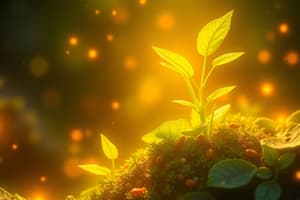Podcast
Questions and Answers
What are thylakoids?
What are thylakoids?
Sac-like photosynthetic membranes, on the diagram they are each individual member of a stack.
What is a granum?
What is a granum?
Stack of thylakoids.
What is the stroma?
What is the stroma?
Region outside the thylakoid membranes in chloroplasts.
What are light-dependent reactions?
What are light-dependent reactions?
What is the Calvin Cycle (Light Independent reactions)?
What is the Calvin Cycle (Light Independent reactions)?
What is the function of ATP?
What is the function of ATP?
What factors affect photosynthesis?
What factors affect photosynthesis?
Where do light-dependent reactions take place?
Where do light-dependent reactions take place?
Where does the Calvin Cycle take place?
Where does the Calvin Cycle take place?
What molecules are needed for photosynthesis?
What molecules are needed for photosynthesis?
What molecules are produced in photosynthesis?
What molecules are produced in photosynthesis?
What is a chloroplast?
What is a chloroplast?
What pigment makes plants green?
What pigment makes plants green?
What are light-independent reactions also called?
What are light-independent reactions also called?
Flashcards are hidden until you start studying
Study Notes
Photosynthesis Structure and Components
- Thylakoids are sac-like photosynthetic membranes found in chloroplasts, organized in stacks.
- Granum refers to a stack of thylakoids, essential for the light-dependent reactions of photosynthesis.
- Stroma is the fluid-filled space outside thylakoid membranes in chloroplasts, where the Calvin Cycle occurs.
Light-Dependent Reactions
- Light-dependent reactions utilize energy from light and water to generate ATP (energy currency) and oxygen, which is released into the atmosphere.
- These reactions occur within the thylakoid membranes of chloroplasts, where chlorophyll absorbs light energy.
Light-Independent Reactions (Calvin Cycle)
- The Calvin Cycle, also known as light-independent reactions or named after Melvin Calvin, uses ATP and carbon dioxide (CO2) to synthesize high-energy sugars, like glucose.
- The Calvin Cycle takes place in the stroma of chloroplasts.
Photosynthesis Requirements and Outputs
- Key molecules required for photosynthesis are carbon dioxide (CO2) and water (H2O).
- Products of photosynthesis include glucose and oxygen, serving as energy sources for plants and oxygen for living organisms.
Role of ATP
- ATP provides essential energy for various cellular reactions, enabling metabolic processes in living organisms.
Factors Influencing Photosynthesis
- Effective photosynthesis is influenced by several factors including:
- Type of light and pigments present in plant cells.
- Amount and intensity of light exposure.
- Availability and abundance of CO2.
- Source and abundance of water (H2O).
- Environmental conditions such as temperature and pH.
Key Pigment in Photosynthesis
- Chlorophyll is the pigment responsible for the green color in plants, crucial for absorbing light energy during photosynthesis.
Summary of Photosynthesis Processes
- Light-dependent reactions produce ATP and oxygen using light energy and water.
- The Calvin Cycle synthesizes glucose using ATP and CO2, highlighting the interconnectedness of these processes in photosynthesis.
Studying That Suits You
Use AI to generate personalized quizzes and flashcards to suit your learning preferences.




